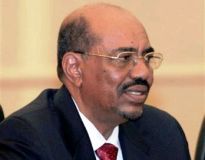Sudan backs Darfur plan but concerns remain
Dec 26, 2006 (UNITED NATIONS) — Sudanese President Omar Hassan al-Bashir has told the United Nations he endorses a plan for a joint African Union-U.N. peacekeeping force to help quell violence and protect civilians in Darfur.
 But in a December 23 letter to U.N. Secretary-General Kofi Annan made public on Tuesday, Bashir also said the plan should be carried out through a special panel on which Khartoum has a seat, a move diplomats said would effectively give Sudan veto power over all aspects of its implementation.
But in a December 23 letter to U.N. Secretary-General Kofi Annan made public on Tuesday, Bashir also said the plan should be carried out through a special panel on which Khartoum has a seat, a move diplomats said would effectively give Sudan veto power over all aspects of its implementation.
Diplomats who have seen the letter, distributed to members of the 15-nation U.N. Security Council on Tuesday, said that while Bashir’s message contained positive elements, it was not clear whether it represented a real step forward in putting the plan into effect.
To help sort out the situation, the council is expected to invite Annan to brief it on the letter later this week, U.N. officials said.
The question of whether Bashir was now standing aside and eliminating obstacles to the plan, or clinging to ambiguities in an effort to further stall its implementation, was crucial as Annan is preparing to leave office this Sunday to make way for new Secretary-General Ban Ki-moon of South Korea.
Bashir was replying to a letter from Annan delivered last week in which the secretary-general tried to pin down the Sudanese leader by asking him to give his formal consent for what Annan has been describing as a hybrid AU-U.N. force of at least 22,600 troops and police.
Bashir has flatly opposed a purely U.N. force, calling it a move to recolonize his vast East African nation. He has made a series of contradictory statements on a hybrid force.
At least 200,000 people have been killed and 2.5 million driven from their homes and into squalid camps during three years of fighting in Darfur between rebel groups, government troops and government-backed militias.
‘VIABLE FRAMEWORK’ FOR PEACE DEAL?
Under the hybrid plan, which has already been endorsed by the African Union, the force would be under AU command.
But the commander would report to a special envoy who would be jointly appointed by the African Union and the United Nations and who would be in charge of the overall political direction of the international mission in Darfur.
In his letter, Bashir said he agreed that the AU-U.N. plan, which leaves the size and composition of the force up to the AU and the United Nations, would “constitute a viable framework for peaceful settlement to the conflict in Darfur.”
He also said an existing agreement between the United Nations and Khartoum on the legal status of an existing U.N. mission in southern Sudan “would be applicable” to the situation in Darfur as well.
U.N. diplomats, speaking on condition of anonymity, welcomed that statement, which they said appeared to provide a legal basis for U.N. troops in Darfur.
But they expressed concern about Bashir’s statement that deployment of the hybrid force would be carried out through the Tripartite Committee, a body on which Sudan served alongside the United Nations and the AU.
U.N. officials have in the past warned that empowering the Tripartite Committee in this way appeared to give the Khartoum government veto power over AU-U.N. moves.
Annan, in initial comments on the letter on Friday, before its public release, said the reports he had received about it “encourage me to think we may tomorrow (Saturday) receive a green light from President Bashir.”
He said he expected Bashir to agree “to a full ceasefire, a renewed effort to bring all parties into the political process, and deployment of the proposed hybrid African Union-United Nations force to protect the population.”
(Reuters)
